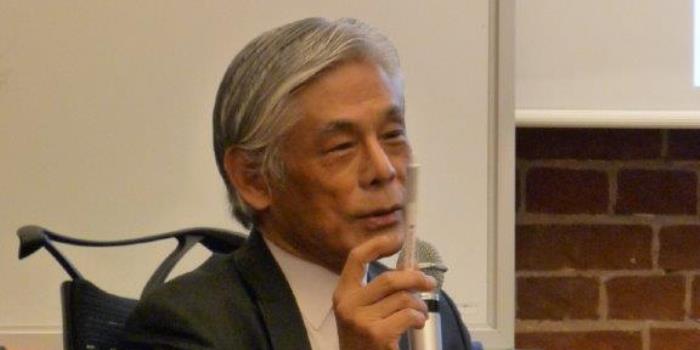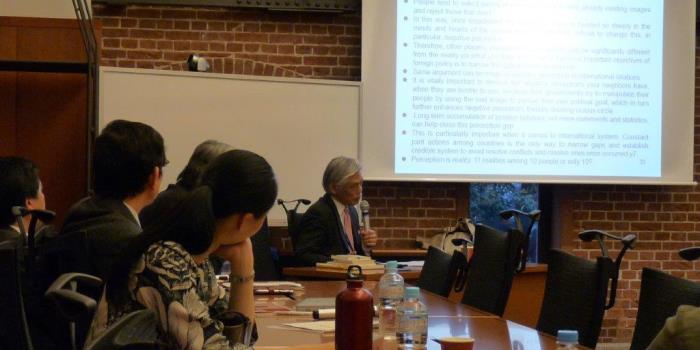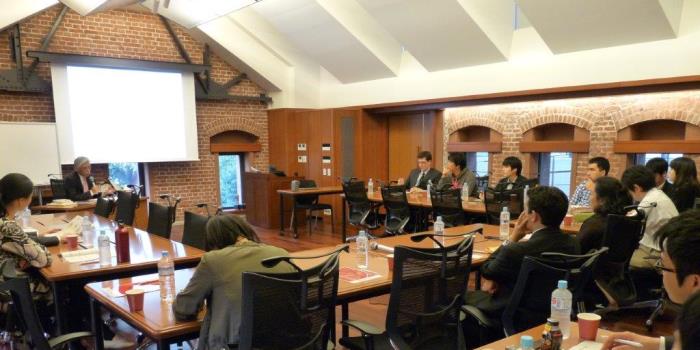SSU Forum with Professor Seiichi Kondo
| Date: | Thursday, April 17, 2014, 17:00-18:30 |
|---|---|
| Venue: | Conference Room, 3rd Floor, Ito International Research Center |
| Subject: | “Perception is reality—Its Advantages and Disadvantages in Conducting Foreign Policy” |
| Lecture: | Professor Seiichi Kondo (PARI) |
| Language: | English |
The Security Studies Unit was honoured to have Professor Seiichi Kondo as guest speaker on the topic: Perception is Reality: Its Advantages and Disadvantages in Conducting Foreign Policy. Professor Kondo has recently joined the Policy Alternatives Research Institute after retiring from Japan's Ministry of Foreign Affairs, where he served in leading positions at several diplomatic delegations before becoming the Commissioner of Japan's Agency for Cultural Affairs. His intellectual attention has been focusing on the role of culture and the impact of culturally enhanced perceptions on diplomatic activities.

SSU Director Professor Fujiwara introduced professor Kondo highlighting his important career achievements and his contributions to our understanding of diplomatic activity.
Professor Kondo has opened his talk by reminding the audience of the great transformation underwent by diplomatic activities with the emergence of alternative communication channels other than the traditional government-to-government relations. Indeed, today's diplomatic initiatives can entail a government addressing directly the public opinion of another state (public diplomacy), or private actors engaging in some kind of diplomatic activity, both directed towards foreign governments or other private subjects in foreign countries. Reviewing the issue of the insurgence of international conflicts, Professor Kondo has focused on the problematic definition of national interests and the need (and duty) for a government to protect and defend them, by formulating an appropriate foreign policy. This exercise is in turn largely based on the perception which the government, the intellectuals and the public at large holds in relation to the position of the country and its trajectory. When interacting with other states, agreements should be met within those areas where interests of both states overlap. However, because the determination of this very areas is based on perceptions, it may well happen, as it often does, that the area of actual overlap is quite different from the perceived one, leading to the adoption of sub-optimal policy decisions.
In all this therefore, perceptions and cultural images as the product of perception stratifications play a major role in diplomatic activities, and professor Kondo has successfully strengthened his case by referring to his own professional experience as a diplomat serving at the Japanese Embassy in Washington DC during the 1995 Japan-US trade crisis on car imports. The crisis unfolded against the background of a perceived threat posed by Japanese car manufacturers in acquiring growing share of the US car market without an adequately fair symmetric access by American brands to the Japanese market. This perception was built on the stereotypical image of Japan as an extremely conservative, secluded and change-adverse country. Although this perception was indeed not at all corresponding to the data describing the situation of the Japanese car market, USTR Mickey Cantor constructed the US position in this dispute based on this perceptions. As diplomatic negotiations ensued, it appeared that many US claims were not entirely substantiated. But as the conclusive agreement on car trade was reached with the successful defence of Japan's position, the press produced the image of a US victory by means of yet another rhetorical manipulation of the public's perception.

Finally, Professor Kondo explored the ways in which perceptions may change overtime in spite of the resilience of prejudices and stereotypes. The provision of accurate information on a certain country in order to challenge its establish image may yield little significant improvement, as the public so goes the argument develop by social psychologists - tend to discard information which does not fit the pre-existing perception. Only the accumulation of positive behaviour in the long term can produce the result of changing how a country is perceived, and lead to the overcoming of prejudice. Building on this, Professor Kondo has finally remarked the importance for Japan to concentrate on the improvement of its international image by relying on a long term commitment to positive behaviour, in order to progressively remove the negative perception which is unfortunately still present in the public of a number of countries.

-
Security Studies Unit, Policy Alternatives Research Institute, the University of Tokyo
